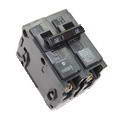Circuit Troubleshooting for Emergency Lighting
 '; ';
|
How to Perform Electrical Troubleshooting for an Emergency Lighting Circuit – Emergency electrical wiring repairs should be made using the right materials for your particular application. Here are a few choices to help you decide what you’ll need. © By: Dave Rongey |
Electrical Troubleshooting for Emergency Lighting Circuit
Electrical Question: I have a 20amp emergency lighting circuit breaker feeding four emergency light fittings that has tripped inside the distribution box but now when I turn it back on it trips out immediately indicating a short circuit somewhere along the emergency lighting circuit. So far I have disconnected the wire from the circuit breaker to see if it’s a bad circuit breaker or a short circuit.
With the output load disconnected I am able to turn the circuit breaker back on, as soon as reconnect the output load the circuit breaker trips when I turn it back on verifying that I have a short circuit.
Next I checked with a meter at the distribution box to see if the live conductor is shorting between earth or neutral. I am getting the meter bleeping when I check between live and earth verifying that the short circuit is between live and earth.
Next I have disconnected the emergency lighting radial circuit at all four spur outlets and therefore breaking the circuit into four sections. I go back to the distribution box turn the circuit breaker back on and it trips again which is now indicating that the short circuit lies between the distribution box and the first spur outlet.
Just to verify this I have run a separate mains power source to the first spur outlet and this emergency light now works I then reconnected the second one this one now works, reconnected the third one this one now works, reconnected the fourth one this now works, this now tells me that all the wiring from the first spur outlet to the last one which is the fourth one is all ok.
Now that I know that the short circuit lies between the distribution box and the first spur outlet for the emergency lighting, I have started removing trunking lids off and inspecting the cable for the short circuit by taking the single cable out of the trunking starting at the spur outlet end and working my way back to the distribution box.
I am OK inspecting the cable until it goes into the ground and runs for about eight meters before it comes up back into the distribution box, where I continue inspecting it until it goes back to the circuit breaker that?s tripping out because of the short circuit.
The short circuit lies inside the trunking, which is underground and runs for about eight meters. I then decided to run in a new cable through the underground trunking and use the old single cable as a pull through; unfortunately the cable inside the trunking is so tight because of the amount of cable that is going through the trunking.
I am unable to feed a cable through, as there is no way for me to get the cable through having tried to get through from both ends of the trunking.
The trunking is eight inches by eight inches and packed to full capacity of cables.
I would be grateful for your advice and guidance on how to locate the location of the short circuit using the most appropriate test instrument and then once the location has been pinpointed then the most appropriate method getting to the cable in order to carry out the repair which would be to insulate the live conductor from earth.
Thank you.
This electrical question came from: Bruno, a Electrician from Doncaster, UK.
See more about Home Wiring in the UK
Additional Comments: Good and easy to use
Dave’s Reply:
Thanks for your electrical question Bruno.
Repairing Electrical Wiring
Electrical Splices – Part 1 – Emergency electrical wiring repairs should be made using the right materials for your particular application. Here are a few choices to help you decide what you’ll need.
Using Testers to help with Electrical Repairs
Testers that help with Electrical Repairs
Using Electrical Testers and Voltage Meters
Understanding Digital Volt Meters
When working on home electrical wiring using voltage meter can play an important part in electrical safety. Electrical testers and voltage meters enable you to identify electrical circuits and help prevent the possibility of accidental electrical shock.
Types of Electrical Testers
Using Electrical Testers and Voltage Meters
The Following resources will assist you with your electrical question:
Wiring Electrical Outlets for the Home
Home electrical wiring includes 110 volt outlets and 220 volt outlets and receptacles which are common place in every home. See how wiring electrical outlets for the home are done.
Electrical Circuit Wiring
This article looks at common 120 volt and 240 volt house wiring circuits and the circuit breakers that are installed identifying the types and amperage sizes used in most homes.
Electrical Panel Circuit Listing
Home Electrical Circuit Breakers
A guide to home electrical circuit breakers and how they work to protect your electrical wiring. When properly installed, your home electrical wiring is protected by a circuit protection device.
Electrical Wire for the Home
Complete listing of electrical wire types and parts used for home projects with electrical code information serves as selection guidelines.
Planning and Installing Home Lighting
Home lighting articles covering recessed lighting, under cabinet lighting, lighting terminology and more.
Lighting For The Home
Lighting Electrical Codes
The following may also be helpful for you:
|
|
Be Careful and Be Safe - Never Work on Energized Circuits!
Consult your Local Building Department about Permits and Inspections for all Electric Wiring Projects.
More articles about Circuit Breaker, Electrical Wiring, Emergency Lighting Circuit and Home Electrical Wiring: |
|
| « Previous | Next » |
Electric Motor Overload Switch |
Electrical Panel Ground and Neutral Bonding |


















